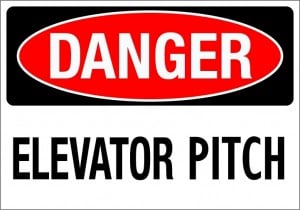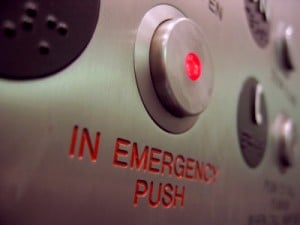In the December 13, 2016 Ask The Headhunter Newsletter, a reader asks how to formulate an exceptional elevator pitch.
Question
I have been out of the corporate world for over 10 years. I recently sold my business and am contemplating my options. I am too young to retire (in my mid-50s), yet too old to be a hot prospect for most companies, so I am networking.
I was recently asked for an “elevator speech” about myself. Of course, I know what that is, and admit it has value because it forces focus. Yet I am vexed by the prospect of re-developing such a tool, partially because I am not sure what I really want to do and I want to keep my options open, and in part because I always question the value of a bumper-sticker-tool in changing times.
What are your thoughts? Is an elevator pitch valuable? What are the critical elements as you see it? How should it be developed and delivered? What’s the best you have heard?
Thanks for your time. I have been a subscriber for several years and recognize a great content developer, and blogger, when I see one!
Nick’s Reply
There’s no way to focus on what you cannot see, but more about that in a moment. Your instinct is right. It’s time to hack the elevator pitch, because I think elevator pitches (or speeches) are nonsense.
They’re a product of the career coaching industry, which wants your money, and which tends to fabricate stuff it can sell you. (I tell this to Executive MBA students at Cornell, Wharton, UCLA and other schools whenever I do workshops for them.)
What’s an elevator pitch?
By definition, an elevator pitch is about you. You meet me in an elevator and you spout your pitch. But I don’t know you, so I couldn’t care less about you. I don’t need or want to hear about you. Why would I be impressed that you can talk about yourself?
I care about my business and the problems and challenges I face. And they’re all unique to me. (See How to get the hiring manager’s attention.) Hearing about you does nothing for me, because when you rattle off that speech your objective is for me to listen carefully, then to invest my time trying to figure out what to do with you. That’s an unreasonable presumption.
What’s worth listening to?
Now, if you have something useful and specific to say about my business that reveals you’ve already made an investment to understand my plight — that’s worth listening to.
If you say something on the money about my business, the encounter shifts. I’m suddenly interested in who you are, and I might want to know more about you. We might even become great friends.
The trouble with job seekers
This brings us to the fundamental trouble with job seekers. On the whole, what’s painfully lacking in their presentation is attention to the person they’re addressing. An elevator pitch is all about the speaker — it shows no real respect to the listener.
Similarly, a resume that you hand to every employer is about you, and your objective is for each employer to figure out what to do with you. Consider how presumptuous that is. More to the point, consider that no employer has the time, interest or ability to figure out what to do with every job seeker that comes along!
(Think I’m daft? For all the resumes you send to employers where you’re convinced you’re perfect for the job, how many of them invest the time necessary to conclude that you’re the perfect candidate? Employers don’t do what job seekers presume they do. That’s why using automated job application tools to hit as many employers as possible is stupid and unproductive. So why do people keep doing it?)
Who are you pitching to?
If you think about it, investing time in producing a canned elevator pitch is pretty silly. Selectively and thoughtfully investing some serious time in understanding the business and problems of someone you want to work with — that’s smart. Of course, it means you must carefully select your target, right? Or, why bother making such an investment? You must prepare a short speech that’s highly specific to that individual — one that wouldn’t mean anything to anyone else.
Only if you have time to do that do I have time to hear you out.
When you ran your business, did you ever stand on a street corner reciting information about your products to impress people? I know the answer. So, why would you even consider doing that now?
Hack your elevator pitch
 The best elevator pitch I’ve ever heard goes like this: “By doing XYZ, I can increase your profitability by 10%.” There’s the focus you mentioned — but to bring that kind of focus, you must first clearly see and examine the object. And that object is my business. Can you hack my business? (See Stand Out: How to be the profitable hire.)
The best elevator pitch I’ve ever heard goes like this: “By doing XYZ, I can increase your profitability by 10%.” There’s the focus you mentioned — but to bring that kind of focus, you must first clearly see and examine the object. And that object is my business. Can you hack my business? (See Stand Out: How to be the profitable hire.)
Thanks for your kind words. Glad you enjoy Ask The Headhunter. Please use your good business sense when pursuing a job, if it’s a job you want. Because employers don’t pay for elevator pitches or interview skills. They want business acumen that addresses their specific issues, and that contributes to their bottom line. One size does not fit all.
What will get the attention of someone you want to work with? Do you use a prepared speech? How do you know what to say?
: :



